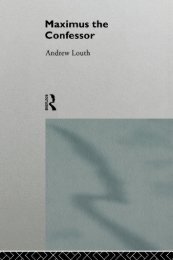Gospels of Thomas and Philip and Truth - Syriac Christian Church
Gospels of Thomas and Philip and Truth - Syriac Christian Church
Gospels of Thomas and Philip and Truth - Syriac Christian Church
Create successful ePaper yourself
Turn your PDF publications into a flip-book with our unique Google optimized e-Paper software.
into the <strong>Christian</strong> sect. Paul felt that pagans should become <strong>Christian</strong>s directly,<br />
without first being converted to Judaism.... Slowly he changed early <strong>Christian</strong>ity into<br />
a new Pauline Christology.... <strong>Christian</strong>ity was no longer a Jewish sect, for Paul had<br />
ab<strong>and</strong>oned the Mosaic tradition.<br />
Nils A. Dahl, ‘The Particularity <strong>of</strong> the Pauline Epistles as a Problem in the<br />
Ancient <strong>Church</strong>’, Neotestamentica et Patristica: Eine Freundesgabe, Herrn<br />
Pr<strong>of</strong>essor Dr. Oscar Cullman (1962): The particularity <strong>of</strong> the Pauline Epistles was felt<br />
as a problem, from a time before the Corpus paulinum was published <strong>and</strong> until it had<br />
been incorporated into a complete canon <strong>of</strong> New Testament Scripture. Later on, the<br />
problem was no longer felt,... when they served as sources for reconstruction <strong>of</strong> a<br />
general ‘biblical theology’ or a system <strong>of</strong> ‘paulinism’.<br />
Erich Fromm, The Dogma <strong>of</strong> Christ (1963): Paul appealed ... to some <strong>of</strong> the<br />
wealthy <strong>and</strong> educated class, especially merchants, who by means <strong>of</strong> their<br />
adventures <strong>and</strong> travels had a decided importance for the diffusion <strong>of</strong> <strong>Christian</strong>ity....<br />
[This] had been the religion <strong>of</strong> a community <strong>of</strong> equal brothers, without hierarchy or<br />
bureaucracy, [but] was converted into ‘the <strong>Church</strong>’, the reflected image <strong>of</strong> the<br />
absolute monarchy <strong>of</strong> the Roman Empire.<br />
Sylvia Plath, The Bell Jar (1963): The only trouble was, <strong>Church</strong>, even the<br />
Catholic <strong>Church</strong>, didn't take up the whole <strong>of</strong> your life. No matter how much you knelt<br />
<strong>and</strong> prayed, you still had to eat three meals a day <strong>and</strong> have a job <strong>and</strong> live in the<br />
world.<br />
William H. McNeill, The Rise <strong>of</strong> the West (1963): A question which immediately<br />
arose in the <strong>Christian</strong> communities outside Palestine was whether or not the Mosaic<br />
law remained binding. Paul's answer was that Christ had abrogated the Old<br />
Dispensation by opening a new path to salvation. Other followers <strong>of</strong> Christ held that<br />
traditional Jewish custom <strong>and</strong> law still remained in force.... Neither Peter <strong>and</strong> James,<br />
the leaders in Jerusalem, nor Paul ... could persuade the other party.<br />
James Baldwin, The Fire Next Time (1963): The real architect <strong>of</strong> the <strong>Christian</strong><br />
church was not the disreputable, sun-baked Hebrew who gave it his name but<br />
[rather] the mercilessly fanatical <strong>and</strong> self-righteous St Paul.<br />
Georg Strecker, ‘On the Problem <strong>of</strong> Jewish <strong>Christian</strong>ity’, Appendix 1 to Walter<br />
Bauer, op.cit. (1964 ed.): Jewish <strong>Christian</strong>ity, according to the witness <strong>of</strong> the New<br />
Testament, st<strong>and</strong>s at the beginning <strong>of</strong> the development <strong>of</strong> church history, so that it is<br />
not the [pauline] gentile <strong>Christian</strong> ‘ecclesiastical doctrine’ that represents what is<br />
151




